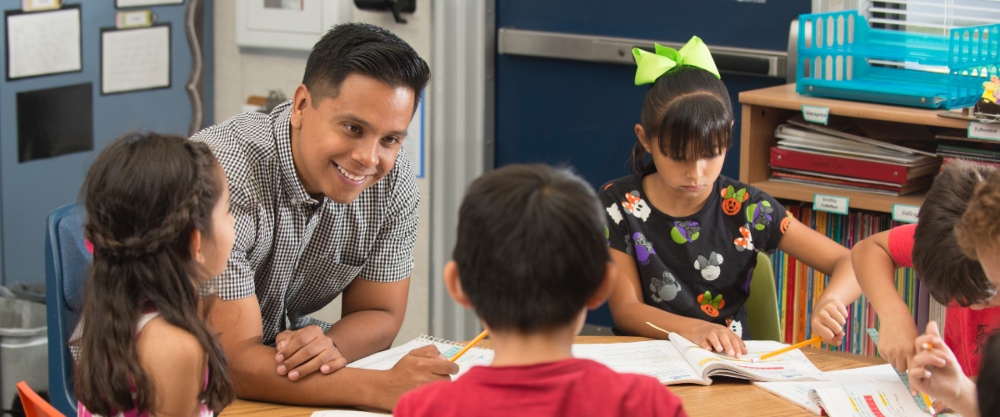Cultural Competency in Cal Poly Pomona’s Credential Programs
October 3, 2023

By: Eliana Rodriguez
Developing cultural competency in the classroom allows educators to understand their own cultural identity, biases, and experience as they continue to learn and make meaningful connections with people from various cultural backgrounds.
As we continue to have very diverse classrooms within K-12, students’ needs become more unique. Cal Poly Pomona’s College of Education and Integrative Studies (CEIS) credential program uses asset-based learning in an attempt to use and recognize intercultural communication to enhance learning of its community.
In addition, CEIS at CPP strives to help teacher candidates develop cultural competency policies that one can implement within their future classrooms.
Associate Professor, Dr. Juarez explains that the notion of developing cultural competency within the classroom is by, “supporting teacher candidates in the decisions they make around lesson plans and how they build relationships and rapport with all of their students.”
A couple of foundational education courses offered within the credential program are Foundations of Education in a Diverse Society and Educating Students with Disabilities in a Diverse Society. Within these courses, there is an attempt to identify the positionality of teachers and where their backgrounds are from. Similar to the teacher candidates as they learn to reflect their experiences in school and their own backgrounds.
As we continue to have very diverse classrooms within K-12, students’ needs become more unique. Cal Poly Pomona’s College of Education and Integrative Studies (CEIS) credential program uses asset-based learning in an attempt to use and recognize intercultural communication to enhance learning of its community.
In addition, CEIS at CPP strives to help teacher candidates develop cultural competency policies that one can implement within their future classrooms.
Associate Professor, Dr. Juarez explains that the notion of developing cultural competency within the classroom is by, “supporting teacher candidates in the decisions they make around lesson plans and how they build relationships and rapport with all of their students.”
A couple of foundational education courses offered within the credential program are Foundations of Education in a Diverse Society and Educating Students with Disabilities in a Diverse Society. Within these courses, there is an attempt to identify the positionality of teachers and where their backgrounds are from. Similar to the teacher candidates as they learn to reflect their experiences in school and their own backgrounds.
By now identifying how the school systems were created, both student and educator can look for the dissonance, inherent biases within the systems, and delve into self- reflectiveness which includes looking at the internal biases one has for themselves.
“In regard to the Education Specialist program, what we are doing is helping to develop the cultural competence and relevant skills to work with diverse student populations within instructional decisions, and building relationships,” said Dr. Juarez.
Associate Professor and Single Subject Coordinator, Dr. Neumann adds to the discussion of the act of self- reflectiveness and states that, “For most of us it requires us to be prompted to develop a level of self-reflectiveness about various kinds of decisions that we make and why we made those decisions.”
Incorporating an asset-based mindset within teaching pedagogies helps ensure equity for diverse student populations by focusing attention on variations in individuals as assets and not deficits.
“One of the things that we've been talking about a lot across the program is encouraging candidates to think in terms of an asset-based mindset like what are the strengths that all different groups of people bring to the table,” said Dr. Neumann.
Additionally, practices and outcomes related to diversity and inclusion are important measures of institutional excellence. With CPP’s current accreditation renewal it helps further create a culture of organizational learning in preparation programs for California’s PK-12 schools.
“In our program we routinely look at the exit surveys that all candidates complete when they're finishing clinical practice so when they're about to leave the program we look at patterns of things that students say about the program. For example, we have conversations about what could we do to better support our students so TPAs feel less overwhelming,” said Dr. Neumann.
CPP was given a two- year grant for faculty development in equity in teaching from the Center for Transformational Educator Preparation Programs (CTEP). Such grant provides guidance in clinical practice and references to equitable teaching.
Dr. Juarez explains that the program’s work within CTEP helps engage further in continuous improvement by reflecting on intersectionality, positionality, and privilege.
“We have a core team who's taking courses on the topics to earn a certificate in equity and excellence related to cultural competence by focusing on justice-oriented teaching to disrupt systemic oppression and discrimination.”
For the next academic year, the credential program hopes to continue developing asset-based lenses with teacher candidates by looking at issues of diversity and equity across all courses and sustain that work past the grant funding.
There are various documents that are used to provide guidance to students in clinical practice. This semester the credential program is piloting in revising one of the reflection tools within the documents to have explicit questions about equitable teaching.
“The way we teach is not the end all be all, it is not everything it could be. I am not an expert in this field and I’m in the process of learning all things. There are opportunities to improve, and we need to see our colleagues as resources to help us see things that are hard for us to see ourselves,” says Dr. Neumann.
In addition to the continuous work in equity within the credential program, it is important to recognize that many of the candidates in the program are themselves students of color, many of them are first generation college students.
By adopting an asset-based mindset and empowering teacher candidates to recognize their own strengths and wisdom will encourage them in creating student centered spaces within their own future classrooms with the notion of achieving cultural competency in mind.